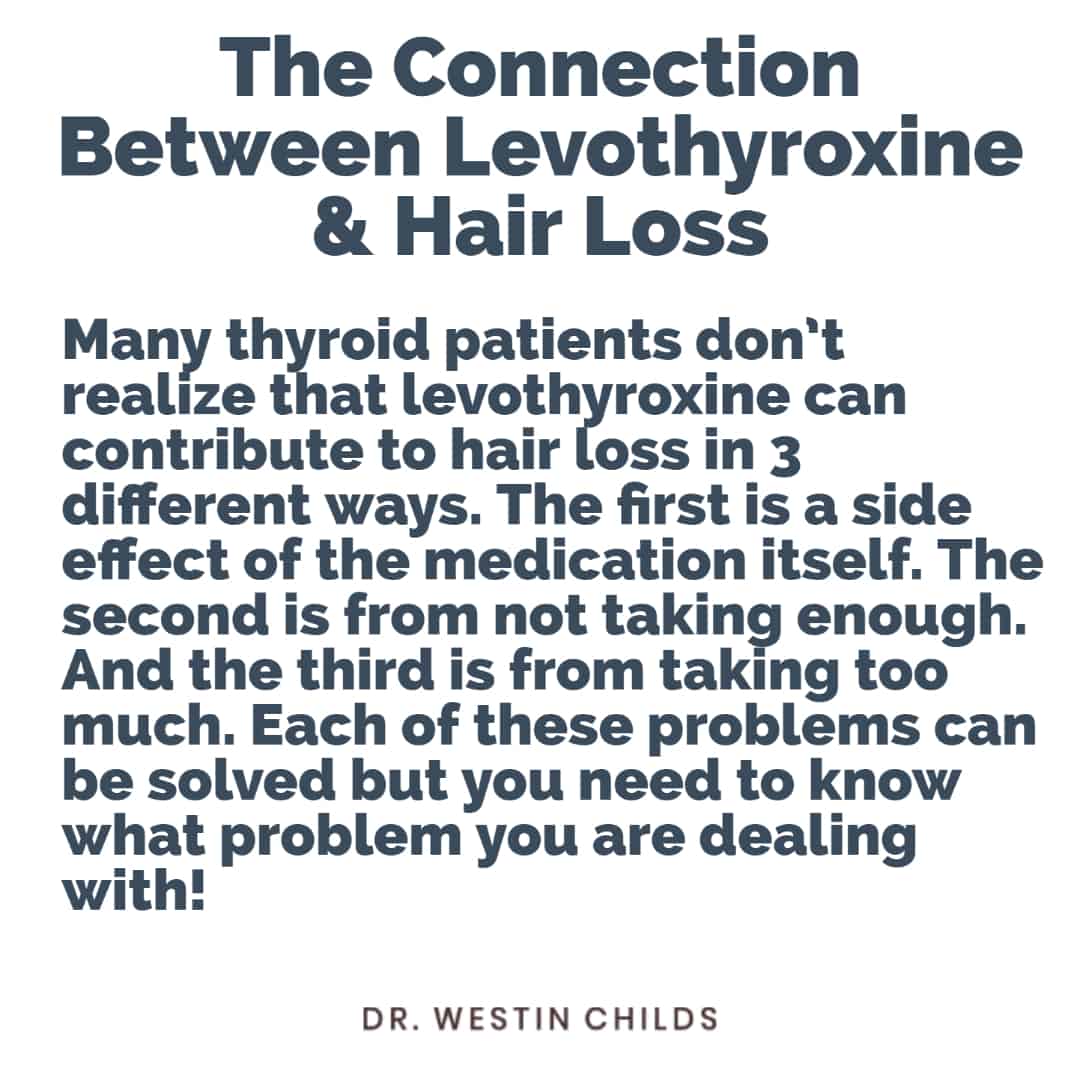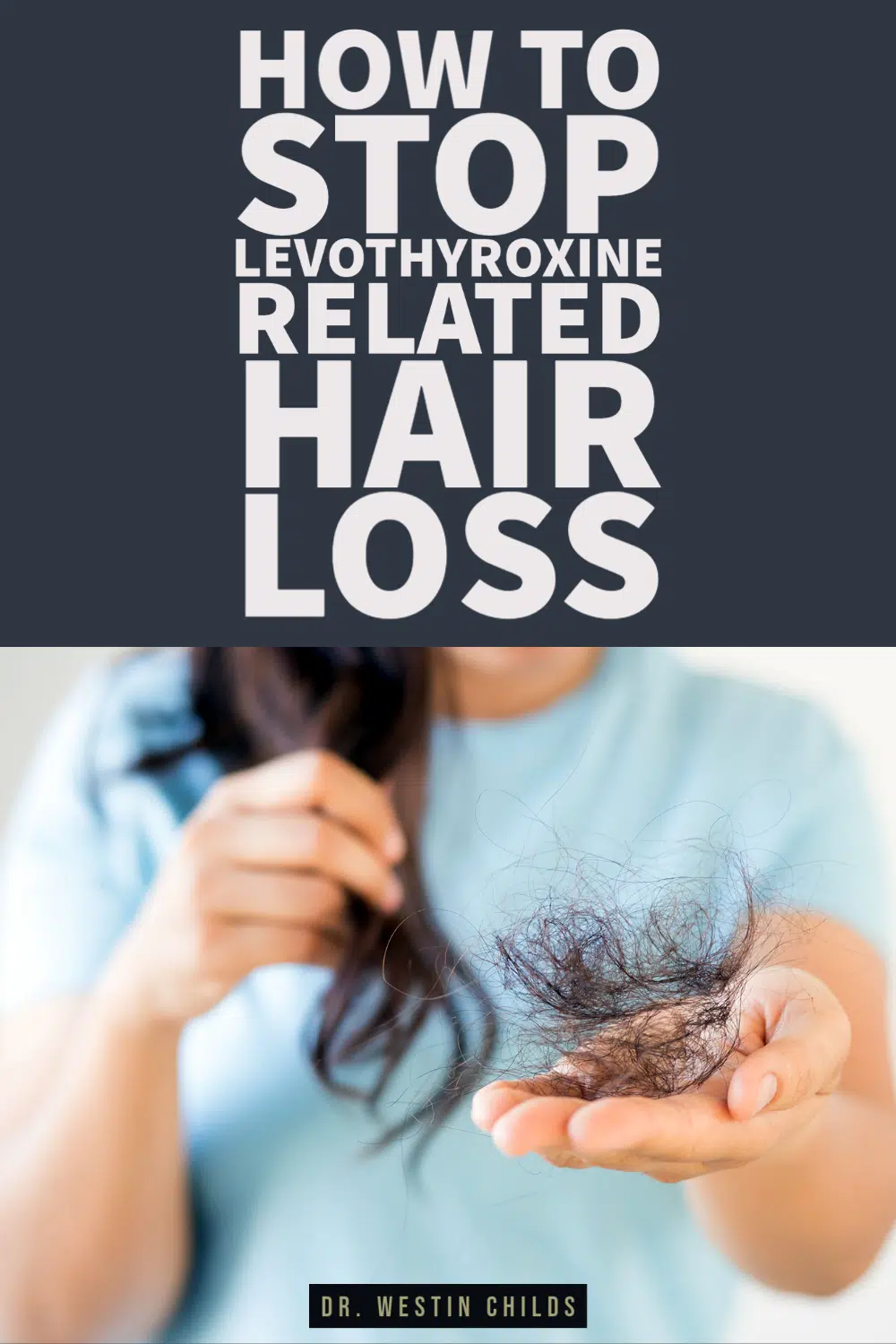Hair loss can be one of the most frustrating symptoms associated with thyroid problems.
And thyroid-related hair loss is not just associated with low thyroid conditions but also high thyroid conditions as well.
Today, though, we will be focusing on hair loss associated with levothyroxine.
Levothyroxine is the most commonly prescribed thyroid medication out there right now.
In fact, it’s one of the most commonly prescribed medications in the United States.
Levothyroxine is used to treat patients who have LOW thyroid function so people who are taking this medication have hypothyroidism.
Levothyroxine is supposed to normalize thyroid function by providing your body with the very thing it needs if you don’t have enough thyroid hormone.
We know that one of the side effects of having LOW thyroid function is hair loss.
And with that in mind, we have a little bit of a problem:
How can it be the case that the very medication that is supposed to fix a low thyroid causes one of the symptoms associated with that very condition?
In other words, shouldn’t it be the case that treating a low thyroid will help your hair grow?
You would think so but it’s not quite that easy.
Today you will learn:
- More about the normal hair growth cycle
- How your thyroid helps to regulate these cycles
- How levothyroxine impacts hair loss
- Why you may need to change your thyroid medication completely to fix your hair loss
- And much more
Let’s jump in…
DOWNLOAD FREE RESOURCES
Foods to Avoid if you Have Thyroid Problems:
I’ve found that these 10 foods cause the most problems for thyroid patients. Learn which foods you should avoid if you have thyroid disease of any type.
The Complete List of Thyroid Lab tests:
The list includes optimal ranges, normal ranges, and the complete list of tests you need to diagnose and manage thyroid disease correctly!
3 Ways Levothyroxine May Cause You to Lose Your Hair
Before we talk about how levothyroxine causes hair loss, let’s talk a little bit about hair loss and thyroid function in general.
You probably already know that your thyroid controls and regulates many systems in your body (1).
This is why patients who suffer from low thyroid function suffer a myriad of different symptoms ranging from hair loss to weight gain to cold intolerance to constipation.
Thyroid function is required to make each of these areas function and if you experience even a slight decrease in thyroid function, you will feel it.
This same concept applies to your hair follicles.
Thyroid hormone helps to stimulate stem cells in hair follicles (2) which causes them to grow.
If you don’t have enough thyroid hormone stimulation then this will result in fewer hair cycles which you will see as a thinning of the hair on your head.

You have to remember that hair loss is a normal part of hair growth cycles.
Even under normal healthy circumstances, you will see hair loss on a regular basis.
The reason this doesn’t result in you going bald is that you are also simultaneously growing hair at the same time.
When you have a thyroid problem, this balance tips in favor of more hair loss and less hair growth.
When this happens, you will start to see more and more hair come out in the shower or when you comb your hair.
This hair fall (or hair loss) will also be accompanied by a DECREASE in how many new hair follicles will start growing.
The result? The typical thyroid hair loss pattern that many of you are probably experiencing right now.
If you are following me so far then you are probably asking why doesn’t levothyroxine help with the hair growth cycle.
Shouldn’t using levothyroxine stimulate hair follicles to grow so that you can regrow your hair?
The short answer is, yes, it should, but due to various reasons, which we will discuss below, it doesn’t always work out that way.
Most of the time, if you are not experiencing hair growth while taking levothyroxine it can be blamed on your dose.
Let me put it this way:
In a healthy state, your thyroid gland is really good at pumping out enough thyroid hormone for all of the cells in your body.
But when you experience a sluggish thyroid, you are replacing thyroid production from your thyroid gland with a prescription thyroid medication (levothyroxine) that you take by mouth.
And pretty much no matter what, this will never be as good as the real thing.
Your thyroid gland can carefully adjust and regulate how much thyroid hormone is being pumped out hour by hour and minute by minute.
That’s not what happens when you take thyroid medication.
When you take thyroid medication, like levothyroxine, you are replacing this complex system with your daily dose of thyroid hormone in a single dose that you take once per day.
It will never be as good as the real thing!
It doesn’t mean it’s impossible to regulate but it does mean that you need to pay close attention to your dose, in other words, how much levothyroxine you take.
Your dose of levothyroxine plays a huge role in whether or not you will be able to regrow your hair:
#1. Your dose of levothyroxine may be too high
If your dose of levothyroxine is too high then you may start to experience hair loss.
And this should make sense.
If you take too much levothyroxine then you will be in a hyperthyroid state and one of the symptoms of hyperthyroidism is hair loss.
And, believe it or not, it happens often!
There are many thyroid patients who are taking levothyroxine for low thyroid function but are accidentally taking too much.
When they take too much it tips them from being LOW thyroid to HIGH thyroid.
Remember:
Levothyroxine contains the same active thyroid hormone that your thyroid gland would be producing naturally (if it was able to).
So it’s actually fairly common to see some thyroid patients taking more than they need (3).
And I’m not talking about accidentally doubling your dose or receiving the wrong dose of medication from the pharmacy.
Because of the reasons I mentioned previously, it can be difficult to nail down how much thyroid hormone YOUR body needs.
Your needs will be different from the next person and each of you will react a little bit differently even to the same dose of thyroid medication.
In addition, how much levothyroxine you need may change over time!
So even if you were taking the same dose of levothyroxine for years and years, it may be the case that something has changed in your body which requires you to adjust your dose.
If you don’t adjust your dose then you may stay on an unnecessarily high dose of thyroid hormone which can build up in your system over time.

If this goes on for months and months, you may enter into a hyperthyroid state and start to experience hair loss.
Taking too much levothyroxine does happen but it’s not quite as common as not taking enough, which we will talk about in just a minute.
How do you know if you are taking too much levothyroxine?
You have to look at 3 key areas:
- The first is your TSH level – Most people who are experiencing hair loss related to too much levothyroxine will experience a suppressed TSH. A suppressed TSH is different from a low TSH. You can sometimes experience hair loss with a low TSH but it’s most frequently associated with a suppressed TSH. A suppressed TSH means that your TSH level is undetectable and will register as something like < .005 or something similar. If you see the less than sign then you know it’s suppressed.
- The second is your free thyroid hormone levels – The TSH can’t be used only by itself, though. In addition to a suppressed TSH, you also need to look at both free T3 and free T4 levels. If you find that you have a suppressed TSH AND either high free T3 or high free T4 then it’s likely that you are taking too much levothyroxine.
- And the third first is your symptoms – Lastly, you also need to pay attention to how you are feeling. This step is very important because there are some people who may have a suppressed TSH and still not be hyperthyroid. But if you have a suppressed TSH, a high free T3 or high free T4, AND the symptoms of hyperthyroidism, it is VERY likely that you are taking too much levothyroxine. Hyperthyroid symptoms to look out for include things like anxiety, rapid heart rate, heat intolerance, diarrhea, tremors in your hands, and even weight loss.
Managing hair loss from taking too much levothyroxine is actually quite easy!
All you need to do is reduce your dose!
As you reduce your dose, your thyroid will come into balance and you should regain normal stimulation of your hair follicles.
#2. Your dose of levothyroxine may be too low
Not taking enough levothyroxine is far more common than taking too much.
So if you are having issues figuring out what exactly your problem is, this is the first place to look!
I’ve lost track of the number of thyroid patients who come to me and tell me that they’ve tried thyroid medication but it just didn’t work for them.
While it is true that you may not be responding to your thyroid medication, there’s no way to know that for sure unless you know that your dose is sufficient!
The truth is that most thyroid patients are being underdosed whether they realize it or not.
The reason for underdosing patients with levothyroxine is simple:
Doctors would always rather give less than is necessary to prevent issues or symptoms from taking too much.
This applies to virtually all medications including hormones as well as thyroid medications like levothyroxine.
In addition, the standard measurement by which doctors evaluate thyroid dosing is the TSH and the TSH does not always correlate with your free thyroid hormone levels.
Put another way, it’s very possible for you to have a “normal” TSH but still not have enough thyroid hormone coursing through your body.
If you aren’t taking enough levothyroxine then you will remain in the low thyroid state!
And, as we’ve already discussed, the low thyroid state is associated with hair loss.
How do you know if you aren’t taking enough?
The first place to look is at your TSH level.
It’s difficult to nail down a specific TSH range but, in general, you can use these guidelines:
- You want your TSH to be less than 2.0 or 2.5 at most. If your TSH is higher than 2.5 while you are taking levothyroxine then you need more.
- Many thyroid patients have more control over their hypothyroid symptoms with a TSH less than 1.0.
- Don’t be afraid of a low TSH but try to avoid a suppressed TSH. A low TSH will flag as “low” but will not contain the less than sign as mentioned above in #1. A low TSH is usually some value less than 0.5.
In addition to looking at your TSH, you should also check on your free T3 and free T4 levels.
If you find that your free T4 or free T4 levels are flagging as LOW then there is a very high chance that you are not taking enough levothyroxine, regardless of what your TSH shows.
The treatment for this problem is quite simple because all it requires you to do is to take more levothyroxine.
Even though the solution is simple doesn’t mean getting your doctor on board is easy.
Some doctors are very set in their ways and have no interest in looking at more than just the TSH or free T3/free T4 levels.
If you find your doctor is not interested in looking at these lab tests then please see this resource which can help you find a better doctor.
#3. Your hair loss may be a side effect of levothyroxine (regardless of the dose)
This one is a little bit more tricky than number 1 and number 2 and can be very frustrating if you aren’t already aware of it.
The truth is that levothyroxine itself can cause hair loss independent of whatever dose you are taking.
It may be the case that you are taking the exact amount of levothyroxine that your body needs to function but you can STILL experience hair loss.
That’s because one of the side effects of levothyroxine is hair loss.
To make matters worse, all thyroid medications have the potential to cause hair loss as well!
All thyroid medications can cause hair loss in a dose-dependent way and all thyroid medications can cause hair loss independent of whatever dose you are taking.
The good news is that even if the various types of thyroid medications CAN cause hair loss doesn’t mean that they always do or always will.
Put another way:
If you find that levothyroxine is causing hair loss it’s probably the case that Synthroid or Tirosint will not.
If you find that Synthroid is causing hair loss then it’s probably the case that levothyroxine or Tirosint will not.
If you find that Tirosint is causing hair loss then it’s probably the case that Synthroid and levothyroxine will not.
So even though they all have the potential to cause hair loss doesn’t mean that they all will.
And what I just described is the treatment for this type of levothyroxine-related hair loss.
All you have to do is switch thyroid medications until you find one that doesn’t cause hair loss as a side effect.
Before you do this, though, you need to be sure that your dose of levothyroxine is not too high or too low.
If you prematurely start changing around what type of thyroid medication you are taking you run the risk of causing more harm than good.
If you don’t ensure that your dose is stable then you will introduce new variables into the equation and you will end up more confused and frustrated than when you started.
For that reason, always ensure that your dose is optimized BEFORE you start thinking about switching to a different brand of thyroid medication.
You can find a list of prescription thyroid medications that you might consider swapping to if you are experiencing hair loss with levothyroxine:
- Synthroid
- Tirosint
- Tirosint-sol
- Levoxyl
- Nature-throid
- Armour thyroid
- WP thyroid
- NP thyroid
- Cytomel
- Liothyronine
- Sustained Release T3
- Compounded T4/T3 medication
- Compounded desiccated thyroid medication
- Levothyroxine injections
As you can see, there are still plenty of options for you to choose from if you find that levothyroxine isn’t working for you.
Keep in mind, though, that transitioning between these medications is not always a straightforward process.
Many of the medications listed above contain different thyroid hormones in varying quantities so you will need to use this conversion chart if you swap from a thyroid medication like levothyroxine to one that contains T3 like Nature-throid.
Also, please note that at the time of this writing, several brands of NDT (natural desiccated thyroid) are not available right now but they should be available at some point in the future!
Additional Factors That Contribute to Hair Loss
It is definitely the case that many thyroid patients struggle with hair loss but you should also be aware that other factors can contribute.
Often times hair loss is due to a variety of triggers including problems with thyroid function or thyroid medication.
For instance, low thyroid function can lead to nutrient deficiencies such as iron and vitamin b12, both of which are necessary for hair growth.
If you have these nutrient deficiencies then changing up your thyroid medication will help some but it won’t bring your hair back to its previous state.
You won’t see significant improvement until you replace these nutrients while also changing up your thyroid medication.
If you aren’t seeing improvement in your hair growth after changing your thyroid medication then check out these supplements:
These nutrients are necessary for hair growth and if you don’t have enough of them your hair will not grow even if your thyroid is stimulating your hair follicles.
You can think of these nutrients like the gas in your car and your thyroid like the gas peddle.
You can push down on the gas peddle all you want but if the gas tank is empty then you aren’t going anywhere.
Final Thoughts
Dealing with hair loss as a thyroid patient can be difficult but it isn’t impossible!
Pretty much every thyroid medication, including levothyroxine, has the potential to cause hair loss but this problem can usually be easily fixed by going through this 3-step checklist:
Is your dose of levothyroxine too high?
Is your dose of levothyroxine too low?
Are you experiencing hair loss from levothyroxine itself?
Start from the top and work your way down and you will find that you should see improvement in your hair texture, quality, and how quickly it grows.
If you aren’t seeing results like you want then also be sure to check on common nutrient deficiencies that may impair hair growth.
Replacing these nutrients may also be necessary for many thyroid patients as low thyroid function can cause or exacerbate certain nutrient deficiencies.
Now I want to hear from you:
Are you suffering from levothyroxine-related hair loss?
Did you know that levothyroxine could cause hair loss?
Do you believe that your hair loss is related to your medication itself or to your dose?
Were you aware of the other nutrients involved in hair growth?
Share your comments or experience below!
Scientific References
#1. https://www.ncbi.nlm.nih.gov/books/NBK500006/
#2. https://www.ncbi.nlm.nih.gov/pmc/articles/PMC4454174/
#3. https://www.aafp.org/afp/1998/1001/p1192.html









